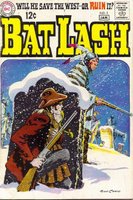
I was not aware of these comics in the 1960s and only recently purchased a couple of issues on ebay, unfortunately, not including the first issue (Four Color #1330), so we'll have to go to Don Markstein's Toonopedia for the origin:
Brain Boy was Matt Price, whose father was killed two months before he was born, in a spectacular car accident that also demolished a high-voltage power line, sending enough electricity through his pregnant mother's body to kill a dozen people. Miraculously, she and Matt both survived, and Matt grew up to be the world's most powerful telepath. He learned early on that kids who can do spooky things get beat up a lot, so he hid his power — but right after he graduated from high school, he was approached by Chris Ambers, also a strong telepath, who recruited him for an agency of the U.S. government so secret, it hid under the name "Organization of Active Anthropologists" so nobody would suspect it was engaged in international skulduggery.
The story in this issue is not particularly unusual: Dictator plans to take over the world by provoking a nuclear war between the US and Russia. However, there are some individual elements that are quite interesting and the concept of a Brain Boy fits in well with the early 1960s, so I thought I would discuss those more than the plot itself.
The early 1960s was a celebration of youth. John F. Kennedy was (and still is) the youngest president ever elected. It was also a time when intellect began to be respected more. The Whiz Kids of Robert McNamara, having reformed and modernized Ford Motor company, moved on to the Department of Defense.
Of course the Whiz Kids weren't really kids; McNamara had been 30 when he joined Ford and 44 by the time he became president of the company. But then, neither was Brain Boy a boy; his adventures start after his graduation from high school.
His powers are not described in full in the story, but it is obvious that they include telepathy, mind control, and the ability to fly:

He also possessed the ability to make himself virtually invisible, a la the Shadow:

Super powers and an origin mark him as pretty much a superhero, although he did not wear a costume. Dell had up till that point mostly specialized in licensed characters such as Donald Duck, but as Don Markstein notes, they had recently spun off much of that business to their Gold Key imprint and thus were apparently willing to experiment more in search of sales. Correction: As noted in the comments by my old buddy King Faraday, Gold Key was an imprint of Western Publishing, which had previously provided content to Dell.
Although Brain Boy did not operate in disguise, he did conceal his true abilities, causing him occasional problems with his girlfriend:

A very standard dilemma for a superhero character and his female companion, although as you can see, Maria (the girl in question) is far from a typical girlfriend for a 1960s superhero character. An interracial romance was definitely cutting edge by the standards of the time.
Brain Boy also lacked the code against killing that was common for the Silver Age:

And as Brain Boy leaves, he says "So die all tyrants." Not quite the literal meaning of "Sic semper tyrannus," (the words John Wilkes Booth shouted after shooting Abraham Lincoln), but close enough that it hardly seems coincidental.
Update: See here for several Brain Boy issues, including the first one (Four Color #1330).






3 comments:
The first issue of "Brain Boy" (with great Gil Kane artwork) and the next several issues are all posted on The Comic Library blog.
Gold Key was the imprint of Western Publishing and Lithographing Company. Western provided the content to Dell for their comic line until they parted ways. Dell began to produce in-house and Western continued under their own imprint. Western held most all the licenses. Kay Kaymen held some of the Disney licenses (see WDC&S indicias) and Dell held a few.
Nice Frank Springer art in this issue.
Acclaim Comics (which acquired rights to several Western/Gold Key characters) planned on a comic book version of Mystery Science Theatre 3000. One of the comics that was to be spoofed was "Brain Boy." The MST3K comic was never published, alas...
Post a Comment